نقد و بررسی
مبانی نظری و پیشینه پژوهش تعلق سازمانی (شغلی) با منابع 2024-2025فهرست مطالب:
- تعریف تعلق سازمانی
- ابعاد تعلق خاطر شغلی
- تفاوت تعهد و تعلق سازمانی
- مزیتهای تعلق سازمانی
- نظریه هویت اجتماعی و تعلق سازمانی
- دیدگاه های مربوط به تعلق سازمانی
- نتایج تعلق سازمانی
- راهکارهای ایجاد/افزایش تعلق سازمانی
- منابع فارسی
- منابع غیر فارسی
بخشی از محصول
انسان از دیر باز به دنبال این بوده که چگونه میتواند بهتر زندگی کند و چه چیزی بیشتر موجبات آن را فراهم میسازد و با چه ساز و کارهایی میتوانند از زندگی در این دنیا لذت ببرد. با مطرح شدن روز افزون اهمیت مشارکت شغلی برای مقابله با پیچیدگیها و مشکلات دنیای امروز، توجه و نظر محققان، اندیشمندان و حتی عوام نسبت به آن تغییر نموده است (مختاری، 1399). تعلق خاطر کاری در رابطه با نگرشهای مربوط به شغل و پیش بینیهای آتی مربوط به کار مثل قصد ترک خدمت، تعهد حرفه ای، رفتار اخلاقی و عملکرد فرد، نقشهای متعارض و مبهم کمتر و آماده سازی کارکنان برای تغییر مورد توجه قرار گرفته است. مفهوم تعلق خاطر کاری در محیط کاری کماکان یکی از مفاهیم چالش انگیز مورد تحقیق در حوزه مدیریت رفتار سازمانی و منابع انسانی است (ال-رومدی و ال-سیسی ،2024).
منابع فارسی
- آقانژاد، یاسر و قدس، احداله (1401) به بررسی رابطه بین جو مشارکتی و تعلق سازمانی کارکنان، مطالعات روانشناسی صنعتی و سازمانی، 9(1). 186-169
- اخروی، امیرحسین و پاسبان، معصومه، (1403)، نگرش سیستمی به مفهوم تعلق سازمانی: پارامترهای موثر، پیامدها، مصادیق، چالشها و راهکارها، اولین کنفرانس ملی دیدگاههای نوین در مدیریت و حسابداری با رویکرد تحول سازمانی، شیراز، 1، 19-1
- بادپا، بهروز (1399) کاربرد تئوری هویت اجتماعی در حسابرسی، چهارمین کنفرانس بینالمللی چشماندازهای نوین در حسابداری، مدیریت و کارآفرینی، تهران، https://civilica.com/doc/1143029
- باقری، مرتضی و رضایی، محمدجواد، (1402)، بررسی رابطه هویت سازمانی و سرمایه اجتماعی با سکوت سازمانی معلمان دبستانهای ناحیه یک یزد، ششمین همایش ملی فناوریهای نوین در تعلیم و تربیت، روانشناسی و مشاوره ایران، تهران، https://civilica.com/doc/1836585
- تبیانیان، حسن و محمدی، شهرام و شاوردیان، فاطمه (1400) هویتیابی سازمانی؛ مفاهیم، مولفهها و عوامل موثر، اولین کنفرانس بینالمللی جهش علوم مدیریت، اقتصاد و حسابداری، ساری، https://civilica.com/doc/1463288
- جلیلی، راضیه و تنها، زهرا و ساکی، مریم (1398) بررسی رابطه بین سبکهای هویت و انگیزه پیشرفت با عملکرد تحصیلی دانشآموزان متوسطه دوم شهر خرمآباد، سومین همایش ملی روانشناسی، تعلیم و تربیت و سبک زندگی، قزوین، https://civilica.com/doc/1020793
- خزاعی، سید مهدی. (1395). بررسی تاثیر هوش هیجانی بر تعلقخاطر کاری (مطالعه موردی سیر و حرکت خط 5 متروی تهران). پایاننامه کارشناسی ارشد رشته مدیریت اجرایی دانشگاه پیام نور
- دوران گرد ناوی، سبحان و خالقخواه، علی (1401)، بررسی رابطه هویت سازمانی با سکوت سازمانی از دیدگاه معلمان مقطع ابتدایی شهرستان تالش، سومین همایش ملی مدرسه آینده، اردبیل، https://civilica.com/doc/1704899
- دهقان، م (1398)، رابطه هوش هیجانی با عملکرد شغلی و مدیریت تعارض در کارکنان سازمان آتشنشانی استان سمنان، پایاننامه جهت دریافت مدرک کارشناسی ارشد، رشته روانشناسی، موسسه آموزش عالی فروردین قائمشهر
- سنگسری، فاطمه و خانفرخانی، آسیه و شاهتقی، مهدیه و حیدری، محمد، (1402)، بررسی مروری ارتباط شفافیت سازمانی و تعهد سازمانی در سازمانها، دهمین کنفرانس بینالمللی تحقیقات بینرشتهای در مدیریت، حسابداری و اقتصاد در ایران، تهران، 15-1
- شریفی، محمد (1402) بررسی عناصر و ابعاد هویت سازمانی و تاثیر آن در پیشبرد سازمانها، نهمین کنفرانس بینالمللی علوم مدیریت و حسابداری، تهران، https://civilica.com/doc/1671551
- فیضآبادی، زهرا. بر حسب هاشمی، مالک (1390). پیشبینی تعلقخاطر کاری بر اساس ویژگیهای شخصیتی در کارکنان بانکهای خصوصی و دولتی شهر تهران. فصلنامه دانش و پژوهش در روانشناسی کاربردی. شماره چهارم.
- قلیپور، ا؛ امیری، ب (1388)، «تاثیر فناوری اطلاعات بر رفتار سازمانی: بررسی چالشهای هویتی در تیمهای مجازی و تاثیر آن بر رفتار اعضای تیم». نشریه مدیریت فناوری اطلاعات، دوره 1، شماره 2، ص 118-103
- لیاقت، فهیمه (1402) رابطهی هویت سازمانی بر سکوت تدافعی سازمانی (مورد مطالعه: شهرداری بندرعباس)، https://civilica.com/doc/1963195
- کرمی مقدم، آرزو، حمیدیه، علیرضا (1403). بررسی تاثیر مدیریت تنوع بر تعلق شغلی از طریق اعتماد سازمانی و امنیت شغلی در سازمان آب و فاضلاب استان البرز. محل انتشار: هفدهمین کنفرانس بینالمللی انجمن ایرانی تحقیق در عملیات، 1-23.
- گلپرور، محسن. و عریضی، حمید رضا.، 1387، فراتحلیلی بر رابطه بین ابعاد تعهد سازمانی با جایگزینهای شغلی، میل ماندن و تمایل به ترک خدمت، دو ماهنامه علمی و پژوهشی دانشگاه شاهد (دانشور رفتار)، سال پانزدهم، شماره 33. 85-97.
- متاجی نیموری، ف و عاشقعلیشاهی، م. (1400). بررسی عوامل موثر بر تعلقخاطر شغلی در سازمان. فصلنامه علمی تخصصی رویکردهای پژوهشی نوین در مدیریت و حسابداری, 5(64), 91-112.
- مختاری سبدانی، مهدی. (1399). رابطه تعلقخاطر کاری با عملکرد شغلی و نقش میانجیگری عدالت سازمانی در بین کارکنان آموزش و پرورش شهر اصفهان پایاننامه برای دریافت درجه کارشناسی ارشد در رشته علوم تربیتی
- میر هاشمی، مالک (1387). پیشبینیکنندههای تعلقخاطر کاری در استادان دانشگاه آزاد اسلامی، فصلنامه روانشناسی تحولی، شماره 15، 235-244.
- مرادی، م؛ موسوی حجازی، ب: (1378)، «نقش طراحان در روند خلق هویت سازمانی». مقالات تدبیر، شماره 194، تیر 1378، صفحه 19.
- محمودی، س (1391)، «بررسی رابطه بین هویت سازمانی با رضایت شغلی و رفتار فرانقش در میان اعضای هیات علمی دانشگاه علوم پزشکی ارومیه». دانشگاه ارومیه
- نوراللهی، علیاصغر و نجفی هزارجریبی، حبیباله (1402) بررسی رابطه بین هویت سازمانی با رضایت شغلی و عملکرد کارکنان سازمان جهاد کشاورزی استان گلستان، نهمین کنفرانس بینالمللی علوم مدیریت و حسابداری، تهران، https://civilica.com/doc/1671566
Non-Persian References
- Ahmad, N., Ullah, Z., AlDhaen, E., Han, H., & Scholz, M. (2022). A CSR perspective to foster employee creativity in the banking sector: The role of work engagement and psychological safety. Journal of Retailing and Consumer Services, 67, 102968.
- Ali, S.H.; Sağsan, M. (2020). The Moderating Effect of Ethical Leadership between Psychological Ownership of Knowledge and Knowledge Hiding: An Empirical Study on the Public Universities in Northern Iraq. Rev. Argent. Clín. Psicol, 30, 178.
- Ahmed I, Z. Abid, G. Contreras, F.; Hassan, Q.; Zafar, R. (2020). Ethical leadership and innovative work behavior: The mediating role of individual attributes. J. Open Innov. Technol. Mark. Complex, 6, 68
- Ahmad, I. Gao, Y. Su, F.; Khan, M.K. (2021). Linking ethical leadership to followers’ innovative work behavior in Pakistan: The vital roles of psychological safety and proactive personality. Eur. J. Innov. Manag. 45-78
- Akyurt, N. (2023). Organizational commitment and job satisfaction in relation to organizational silence and perceived leadership behavior among radiology technicians. Journal of Vocational School of Health Service, 11(3), 1729-1743. APA Format.
- Attar, N. E. (2023). Role expansion of individual workforce through a drama based organisational intervention. EuroMed Journal of Management, 5(1), 29-45.
- Alghatouneh, W., Kruiter, J., Lockhorst, D., Schenke, ., Sligte, H., Smit, B., & de Wit, W. (2016). Affordances of teacher professional learning in secondary schools. Studies in continuing education, 38(3), 281-298
- Ayoub, A.E (2021). Innovative work behavior scale: Development and validation of psychometric properties in higher education in the GCC countries. Eur. J. Innov. Manag
- Al-Romeedy, B.S. and El-Sisi, S. (2024), “Does workplace incivility affect travel agency performance through innovation, organizational citizenship behaviors, and organizational commitment?”, Tourism Review, Vol. 79 No. 8, pp. 1474-1491. https://doi.org/10.1108/TR-06-2023-0389
- BALOGUN, I. N., & ISIAKA, B. A. (2025). Integrating Innovations into Teacher Education through Curriculum, Research Reports and Findings in Nigeria. Ilorin Journal of Education, 45(2), 176–190. Retrieved from https://ije.unilorinedu.sch.ng/index.php/ije/article/view/249
- Bora. L (2024). Inclusion leadership and employee work engagement: The role of organizational commitment in Cambodian public organization, Asia Pacific Management Review, 29(1). 44-52
- Bakker, A. B. (2017). Strategic and proactive approaches to work engagement. Organisational Dynamics, 46, 67–75
- Bakker, A. B., & Schaufeli, W. B. (2014). Work Engagement. Wiley Encyclopedia of Management, 1–5.
- Carmeli, A., 2005, Exploring determinants of job involvement: an empirical test among senior executives, International Journal of Manpower, Vol. 26 No. 5 P. 457-458
- Carmeli, A., 2007, Exploring determinants of job involvement: an empirical test among senior executives, International Journal of Manpower, Vol. 26 No. 5 P. 457-458
- Chong, Y, Reza, M, Hutahayan, B (2025). Fostering high-performing organizations in higher education: the effect of participative leadership, organizational culture, and innovation on organizational performance and commitment, HIGHER EDUCATION | RESEARCH ARTICLE, 12(1). 25-39
- Chungtai AA (2008). Impact of Job Involvement on In-Role Job Performance and Organizational Citizenship Behaviour, PP. 169-170.
- Chow, N. F. M. M., and Abdullah, N. A. (2019). Relationship organizational commitment and emotional intelligence with work performance of adult students. J. Psikol. Malays. 33, 21–32
- Darwish, S.; Ahmed, U.; (2020). Innovative work behavior during COVID-19 for medical representative in the pharmaceutical industry: Test of a moderation model in Bahrain. Int. J. Pharm. Res, 12, 1927–1934.
- Ertaş, B.D., Pekmezci, F.B. Career Motivation and Job Satisfaction in Türkiye: Mediating Role of Teacher Innovativeness and Instructional Practice. Asia-Pacific Edu Res 34, 193–207 (2025). https://doi.org/10.1007/s40299-024-00846-1
- Garcia-Sierra, R., Fernandez-Castro, J., & Martinez-Zaragoza, F. (2015). Work engagement in nursing: an integrative review of the literature. Journal of Nursing Management, 1–11.
- Gülbahar, B. (2017). The Relationship between Work Engagement and Organisational Trust: A Study of Elementary School Teachers in Turkey. Journal of Education and Training Studies, 5(2), 149–159.
- Guo, Y., & Hou, X. (2022). The effects of job crafting on tour leaders’ work engagement: the mediating role of person-job fit and meaningfulness of work. International Journal of Contemporary Hospitality Management.
- Gwal, R., & Gwal, A. (2019). Personality Dimensions as a correlate of Work Engagement: A Study of working women in Indore city. NMIMS Journal of Economics and Public Policy, 4(4), 37-47.
- Hafer, J. C. & Martin, T. N., 2009, Job Involvement or Affective Commitment: A Sensitivity Analysis Study of Apathetic Employee Mobility. Institute of Behavioral and Applied Management. September University of Nebraska at Omaha.
- Koçak, D., & Kerse, G. (2022). How perceived organizational obstruction influences job satisfaction: The roles of interactional justice and organizational identification. SAGE Journal.
- Konovsky, M. A., Cropanzano, M., & Boies, D. L. (2022). The relationship between organizational silence and organizational justice: Exploring the mediating role of organizational trust. Journal of Management, 48(2), 313-337.
- Li, H., Chen, J., & Wang, Y. (2022). Organizational silence and organizational commitment: Evidence from China. International Journal of Human Resource Management, 33(10), 1783-1805.
- Lau, V. P., & Shaffer, M. A. (2023). A typological theory of domestic employees’ acculturation stress and adaptation in the context of globalization. Academy of Management Review, 48(1), 57-77.
- Lee, Y., Lee, J. Y., & Lee, J. (2021). The relationship between work engagement and workaholism: a systematic review and meta-analysis. European Journal of Training and Development.
- Li, X., Xu, Y. & Huang, D. Exploring the interplay between social connectedness, job control, and organizational commitment: the mediating role of work engagement among Chinese teachers. BMC Psychol 13, 31 (2025). https://doi.org/10.1186/s40359-025-02355-2
- Liao. M. t. Wong. I. Tseng. T. Chang., A., V. (2017). Applying consumer-based brand equity in luxury hotel branding, Journal of Business Research. 5(36), 56-71
- Mishra, S.; Braun, E. (2021). The Changing Role of Higher Education: From Social/Societal Aspect to Employability Gains. In Learning Gain in Higher Education; Emerald Publishing Limited: Bentley, UK
- Mirza, B.; Jamil, A. (2021). The influence of ethical leadership on innovative performance: Modeling the mediating role of intellectual capital. J. Manag. Dev, 40, 273–292.
- Mishra, A., & Mishra, S. (2022). The role of organizational silence in conflict management: An empirical study from the Indian public sector. Public Administration Review, 82(2), 381-394.
- Moradi, E., Safania, A. M., & Poorsoltani Zarandi, H. (2019). The causal relationship between organizational silence with organizational citizenship behavior: Mediating role of organizational identity. Journal of Sport Management and Behavioral Sciences, 26(1), 131-150. APA Format
- Mockałło, Z. (2020). Authentic Leadership Style and Worker Innovativeness and Wellbeing: The Role of Climate for Creativity. In Healthy Worker and Healthy Organization; CRC Press: Boca Raton, FL, USA; pp. 25–46.
- Mura, A. L., Nonnis, M., Scrima, F., & Fornara, F. (2023). Promoting the work engagement of the health worker: The role of secure workplace attachment, perceived spatial-physical comfort, and relationship with patients. Journal of Environmental Psychology, 85, 101937.
- Mussagulova, A. (2021). Predictors of work engagement: Drawing on job demands–resources theory and public service motivation. Australian Journal of Public Administration, 80(2), 217-238.
- Nkambwe, I., & Dominic, T. (2021). Work Engagement among Employees of Health Based NGOs: Do all its Dimensions Matter for Quality Service Delivery?. ORSEA JOURNAL, 10(2).
- Ölçer, F. and Coşkun, Ö.F. (2024), “The mediating role of organizational silence in the relationship between organizational justice and organizational creativity”, Society and Business Review, Vol. 19 No. 1, pp. 23-46. https://doi.org/10.1108/SBR-09-2021-0172
- Oberländer, M., & Bipp, T. (2022). Do digital competencies and social support boost work engagement during the COVID-19 pandemic?. Computers in human behavior, 130, 107172.
- Parent-Lamarche, A. (2022). Teleworking, work engagement, and intention to quit during the COVID-19 pandemic: same storm, different boats?. International journal of environmental research and public health, 19(3), 1267.
- Perera, H. N., Vosicka, L., Granziera, H., & McIlveen, P. (2018). Towards an integrative perspective on the structure of teacher work engagement. Journal of Vocational Behavior, 108, 28-41.
- Perera, H. N. Granziera, H. & McIlveen, P. (2018). Profiles of teacher personality and relations with teacher self-efficacy, work engagement, and job satisfaction. Personality and Individual Differences, 120, 171-178
- Schaufeli, W. B., & Salanova, M. (2008). Enhancing Work engagement through the Management of Human Resources. In The individual in the changing working life (pp. 380–402).
- Sharma, A., & Nambudiri, R. (2020). Work engagement, job crafting and innovativeness in the Indian IT industry. Personnel Review, 1–17.
- To, W.M. Martin, E.F. Billy, T.W. (2015). Effect of management commitment to internal marketing on employee work attitude, International Journal of hospitality Management. Vol 45. No 4. Pp 14-21
- Widowati, P. D., & Satrya, A. (2023). Do Emotional Intelligence and Ethical Leadership Elevate Work Engagement? The Mediating Role of Psychological Capital. Media Ekonomi dan Manajemen, 38(1), 186-204.
- Wijayati, D. T., Rahman, Z., Rahman, M. F. W., Arifah, I. D. C., & Kautsar, A. (2022). A study of artificial intelligence on employee performance and work engagement: the moderating role of change leadership. International Journal of Manpower, 43(2), 486-512.
- Wang, Y., & Peng, M. W. (2022). Organizational silence and organizational culture: A comparative study between China and the United States. Journal of Cross-Cultural Psychology, 53(1), 78-93.
- Woolf, A. D. (2022). Chapter 4.2 – Era of regionalization and standardization: 1970s–1980s. In A. D. Woolf (Ed.), History of Modern Clinical Toxicology (pp. 311-327): Academic Press.
- Yue, L., Alias, B. S., & A. Hamid, A. H. (2025). Exploring Teacher Organizational Commitment for Promoting Sustainable Development in Higher Education: A Systematic Literature Review and Analysis of Theories and Methodologies in Chinese Studies. Journal of Ecohumanism, 4(1), 544–. https://doi.org/10.62754/joe.v4i1.5836
- Ye, P., Liu, L. and Tan, J. (2022), The influence of organisational justice and ethical leadership on employees’ innovation behaviour”, European Journal of Innovation Management
- Yemini, M. (2021). Internationalisation by demarcating the role of higher education in Sustainable Development Goals: The case of Israel. Eur. J. Educ., 56, 235–247
- Zhang, M., Zhang, P., Liu, Y., Wang, H., Hu, K., & Du, M. (2021). Influence of perceived stress and workload on work engagement in front‐line nurses during COVID‐19 pandemic. Journal of clinical nursing, 30(11-12), 1584-1595.
- Zhao, H., Chen, Y. and Liu, W. (2023), “Socially responsible human resource management and employee moral voice: based
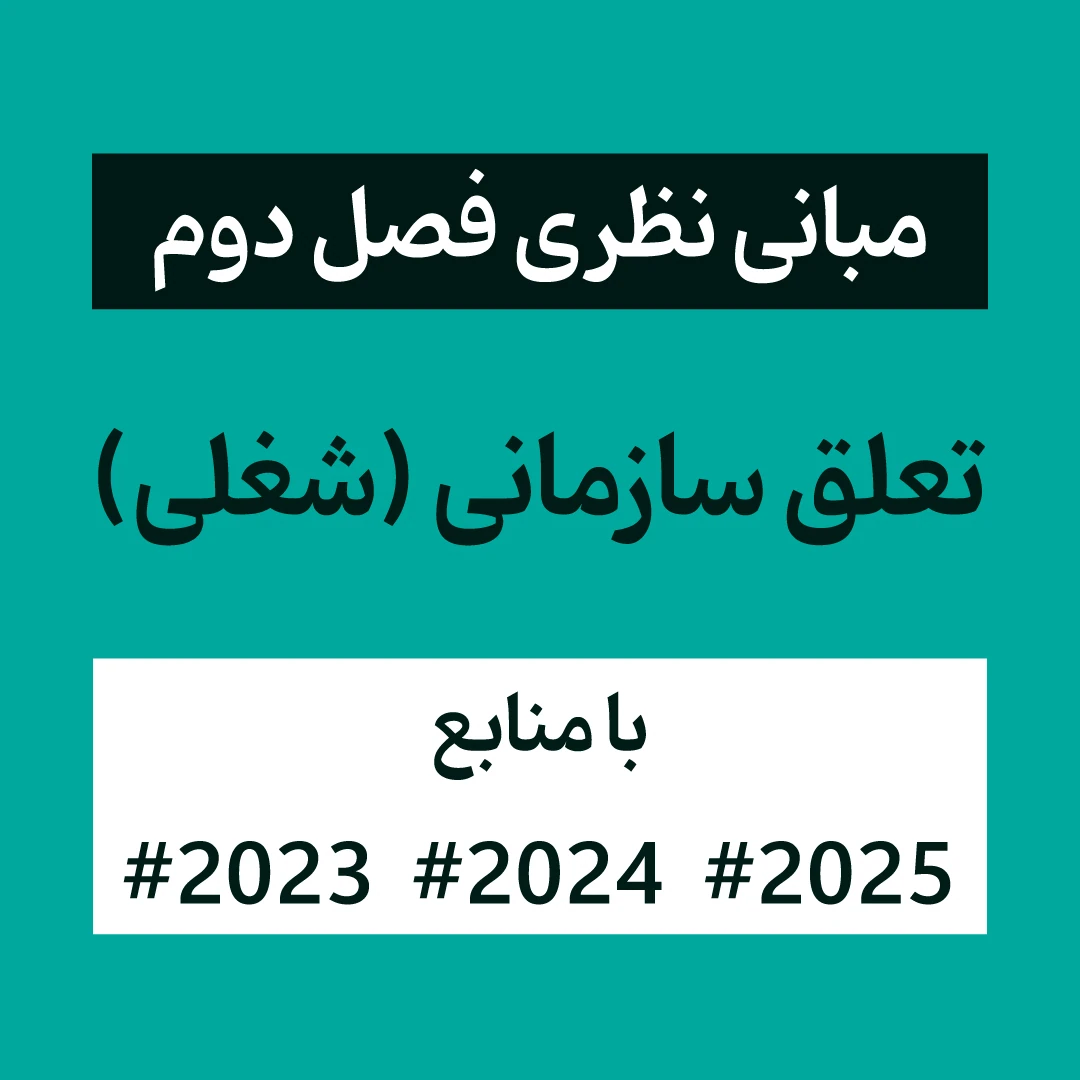
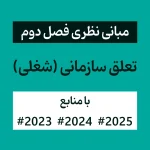
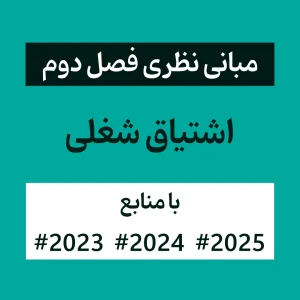
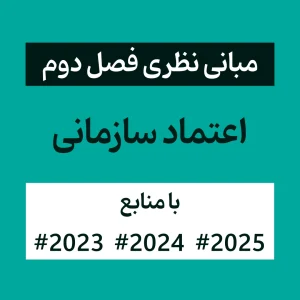
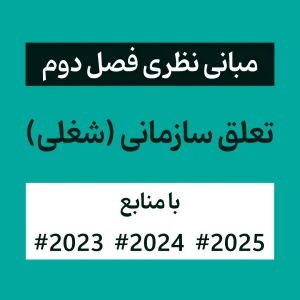
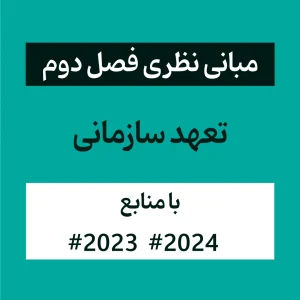
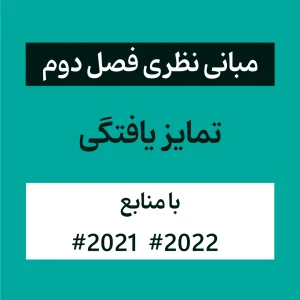

0دیدگاه